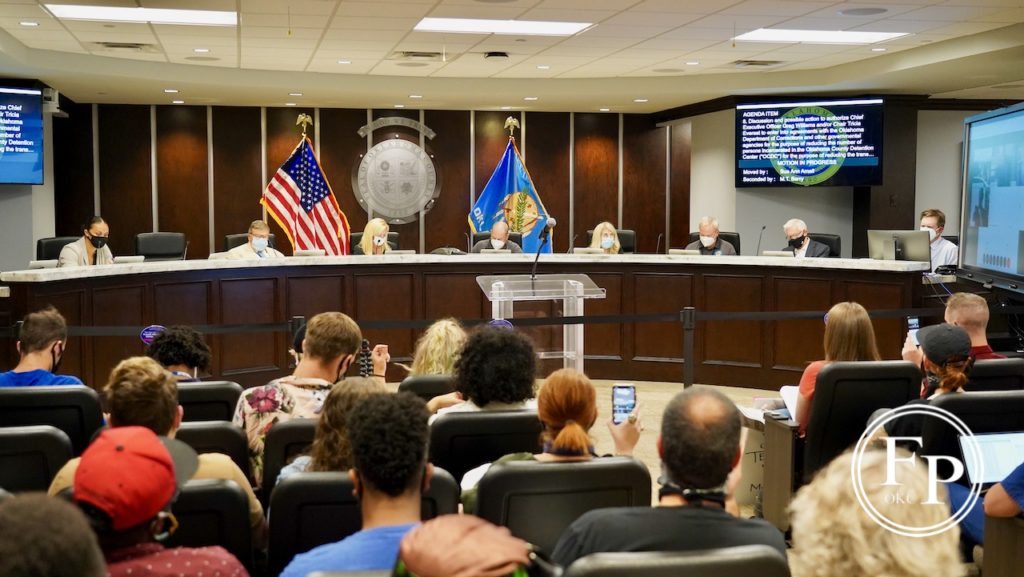Last Updated on August 31, 2020, 4:31 PM | Published: August 31, 2020
In a regular meeting of the Oklahoma County Criminal Justice Authority (Jail Trust) the Trust voted to accept over $37 million in CARES Act funds from the County. Additionally, the Trust heard a report on suicide prevention and care at the Jail.
CARES Funds
Protestors were present for another Jail Trust meeting on Monday afternoon to voice their concerns about a proposed $34 million allocation to the Trust from the County’s CARES Act funds. The approximate dollar amount represents all that is left over of the federal relief money.
The first of two agenda items related to CARES money was for $3 million to address air flow in the jail in order to make the jail more resilient against epidemics. This passed quickly after hearing comments from 5 members of the public.
The next agenda item was to accept the controversial allocation of $34 million of CARES money from the Board of County Commissioners. Seven more speakers addressed the trust, in turns appealing to their humanity by claiming the money would be better used by social programs and attacking the personal character of trustees. Some called the Trust criminals who were lining their pockets with the money.
After public comment, Trustee Francie Ekwerekwu addressed the Trust and its Chair, Tricia Everest, saying that she thought that Jail Trust CEO Greg Williams would furnish a list for specific needs of the jail before the Trust would have to vote on the item. Part of the resolution on the table, she was told, was to formulate such an itemized list. Ekwerekwu moved to defer the vote until such a list could be investigated by the Trustees.
The motion to defer was defeated and a vote to accept the resolution passed 8-2, with Ekwerekwu being joined by Danny Honeycutt of the Sheriff’s Office in voting no on the item.
The protestors in the room erupted in shouts and chants, condemning the Trust for their vote.
As the meeting adjourned, the crowd then followed District 3 County Commissioner and Trustee Kevin Calvey out of the room chanting, “Calvey resign!” The protestors stayed in the hallway outside the meeting room for several minutes chanting and shouting as the gallery and horseshoe emptied.
Suicide Prevention
Dr. Britta Ostermeyer, who contracts with Turnkey Health, the medical provider at the Jail, is the head psychiatrist in charge of mental health care at the jail. In today’s meeting she gave a presentation on suicide prevention models employed at the jail.
Ostermeyer said that all people booked into the jail are required to have a suicide screening. A more thorough mental health screening must also be done within the first 30 days of incarceration.
Those demonstrating a risk of suicide are kept in one of four levels of care.
The first level is for those expressing immediate suicidal ideation. They are moved to an infirmary and are observed around the clock and seen daily, Monday through Friday, by a staff psychiatrist.
The second level, for those believed to be a risk, but who are not verbalizing ideations, has those incarcerated seen daily by a mental health professional and requires observation made every fifteen minutes.
The third level is for people who have mental illness that needs care, but who aren’t expressing suicidal ideation. They see mental health professionals weekly and are observed physically every thirty minutes while in the jail.
The final level is general population, where a candidate may see mental health professionals as needed. These individuals are physically supervised at least once per hour while in the jail.
Ostermeyer went on to explain the process of disrobing someone to be placed in a suicide prevention gown. Greg Williams explained that the roles of guards in the jail were gendered and that a group of male guards would never be responsible for disrobing a female guest of the jail.
The Trust meets again on September 21.
Columnist covering local government in Oklahoma City and Oklahoma County from May 2019 through June 2023.










